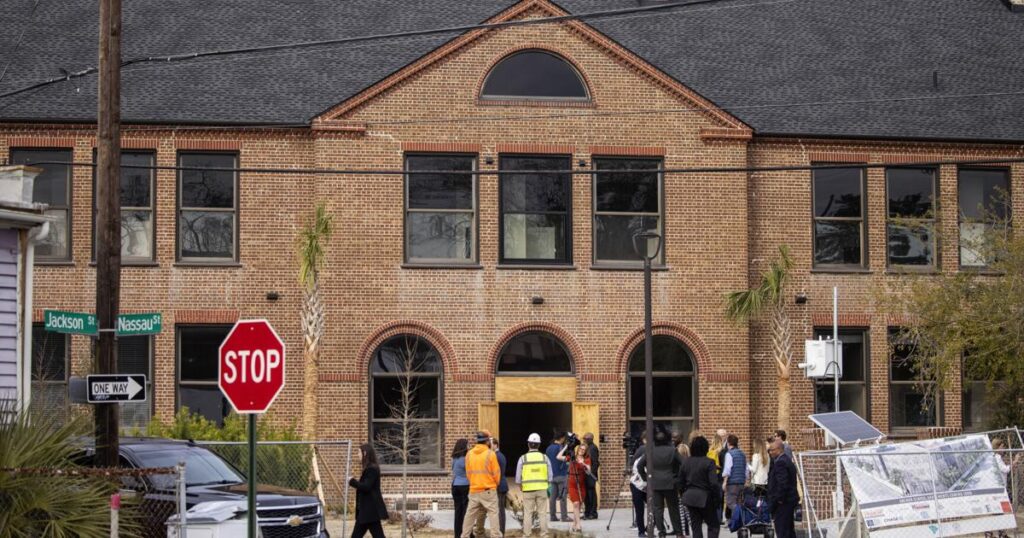Charleston County has put aside greater than $8 million of its tourism taxes to create a loan fund to deliver extra inexpensive housing to the world.
The Native Housing Belief Fund, introduced March 27 by county leaders and its companion, South Carolina Group Mortgage Fund, will present below-market loans to builders and organizations that construct inexpensive housing. These initiatives are expensive and will not occur with out subsidies like this, in line with Christine Durant, deputy county administrator for neighborhood providers.
A change in state legislation made the fund attainable. Till 2023, state and native tourism taxes may solely be used to promote or assist native venues, occasions or initiatives that entice in a single day guests. Now, local governments can use taxes collected on hotel or short-term rental stays toward housing that people who work at motels, eating places and different tourism-centered jobs can afford.
The bipartisan legislation doesn’t present any new funding, however moderately permits localities to earmark as much as 15 p.c of their lodging tax income for housing.
Charleston County, which collects practically $30 million in A-taxes yearly, allotted about $4.2 million final yr and one other $4.1 million this yr to seed the fund. Durant mentioned her division plans to request one other $4.25 million within the coming price range.
The fund will probably be revolving, that means that builders who’re loaned cash can pay it again in sufficient time to be loaned out once more for future initiatives, Durant defined.
It is a mannequin that has labored for the county up to now.
The county used about $20 million of its federal COVID aid cash via the American Rescue Plan Act, or ARPA, to supply “hole financing” for practically a dozen housing initiatives that may add over 700 models to the county’s housing inventory. These developments embody the Archer School Apartments in downtown Charleston, North Bridge Townhomes in North Charleston, and Esau Jenkins Village, which is nearing completion on Johns Island.
Over time, the county has tried different methods of incentivizing inexpensive housing development, Durant mentioned.
“We have modified zoning ordinances. We have given density bonuses the place affordability is included. We have modified parking restrictions. We have accomplished loads of various things, however none of that has actually stimulated a rise till we began placing some funding to fill the hole,” she mentioned. “The price of building, the price of land, all of these issues have pushed up the price of improvement.”
Housing developments can price over tens of tens of millions of {dollars}, so they will not depend on this financing alone. Nonetheless, with out the county subsidizing inexpensive models, Durant mentioned, these initiatives will not occur.
There isn’t any goal for what number of initiatives the present pot of $8 million will assist or what number of models it is going to assist construct.
County Council was fast to acknowledge the housing disaster however has struggled up to now with the right way to pay for options. By tapping into A-taxes, it helps the county deal with housing affordability with out upping native property taxes.
In 2020, county voters rejected a plan for a modest property tax enhance to fund inexpensive housing efforts. The poll referendum narrowly failed, with 51 p.c opposed. In 2022, Council Council determined towards holding one other referendum.
In the meantime, median rents in Charleston County increased by more than 30 percent during the last 5 years, in line with an evaluation by The Publish and Courier.
The median promote worth of a single-family residence within the county has soared from beneath $400,000 in the beginning of 2020 to $635,000 in February, in line with the Charleston Trident Association of Realtors.
Any housing initiatives financed with A-tax cash should serve folks incomes between 30 and 120 p.c of the world’s median revenue.
In Charleston County, that covers these households making between $22,100 and $88,320 as a person, or $31,550 and $126,120 for a household of 4, in line with income limits set by the U.S. Department of Housing and Urban Development.
Functions for funding will open in Might.
